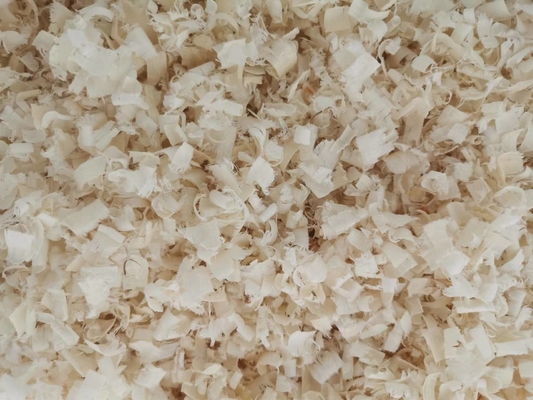

Bedding material: Wood shavings serve as an excellent bedding material for poultry houses. They offer a soft surface for the birds to walk and rest on, promoting healthy foot and leg conditions. The shavings also help absorb moisture, keeping the bedding dry and reducing the risk of bacterial growth. This is particularly important for poultry as damp bedding can lead to health issues like footpad dermatitis or hock burns.
Insulation and warmth: Wood shavings provide insulation, helping to regulate the temperature inside the poultry house. They create a layer of bedding that traps heat and keeps the birds warm during colder seasons. Proper insulation is crucial for maintaining the birds' health and preventing stress-related problems.
Odor control: Poultry waste can produce strong odors if not managed properly. Wood shavings help absorb and control odors by trapping ammonia and other volatile compounds. This creates a more pleasant environment for the birds and the farmers working in the poultry house.
Nesting material: Wood shavings can be used as nesting material for laying hens. They provide a comfortable and clean surface for hens to lay their eggs. The shavings help cushion the eggs, reducing the chances of breakage.
Waste management: Wood shavings can be beneficial in waste management within the poultry house. They can absorb moisture from droppings, reducing the risk of wet litter and ammonia buildup. This promotes better air quality and reduces the incidence of respiratory issues among the birds.
Comfortable surface: Wood shavings provide a soft and comfortable surface for poultry to walk, rest, and nest on. The shavings create a cushioning effect that helps reduce the risk of foot and leg problems, such as bumblefoot or leg injuries.
Moisture absorption: Wood shavings have excellent moisture-absorbing properties. They can effectively absorb and retain moisture from poultry droppings, preventing the bedding from becoming damp. By maintaining dry bedding, wood shavings help reduce the growth of bacteria, fungi, and parasites, promoting a healthier environment for the birds.
Odor control: Poultry waste can produce strong and unpleasant odors. Wood shavings help control odors by absorbing and trapping ammonia and other volatile compounds present in the droppings. This results in a more pleasant and breathable atmosphere in the poultry house, benefiting both the birds and the farmers working in the facility.
Insulation and temperature regulation: Wood shavings provide insulation, helping to regulate the temperature inside the poultry house. They create a layer of bedding that helps retain heat during colder seasons, keeping the birds warm and reducing the risk of cold stress. In warmer weather, the bedding helps to moderate the temperature and prevent overheating.
Nesting material: Wood shavings are suitable for use as nesting material for laying hens. The shavings provide a comfortable and clean surface for hens to lay their eggs. They help cushion the eggs, reducing the likelihood of breakage and providing a conducive environment for successful incubation.
Dust reduction: Compared to other bedding materials like straw or hay, wood shavings tend to produce less dust. This is beneficial for the respiratory health of the birds, as excessive dust can irritate their respiratory system and contribute to respiratory problems.
Ease of handling and disposal: Wood shavings are lightweight and easy to handle, making them convenient for bedding management in poultry houses. They can be easily spread, replaced, or removed as needed. Wood shavings also decompose relatively easily, simplifying the disposal process when it comes time to clean out the bedding.
Quality and cleanliness: Ensure that the wood shavings are clean and free from contaminants or harmful substances. Avoid using shavings from treated or painted wood, as these can be toxic to the birds.
Bedding depth and maintenance: Maintain an appropriate bedding depth to provide sufficient cushioning and absorbency. Regularly monitor and manage the bedding to maintain cleanliness and dryness.
Source and sustainability: Choose wood shavings from sustainable sources to minimize environmental impact. Look for products made from responsibly managed forests or consider using recycled wood shavings.
Overall, wood shavings offer several benefits in poultry farming, including comfortable bedding, moisture absorption, odor control, insulation, and waste management. Their use can contribute to improved poultry health, welfare, and overall farm hygiene.